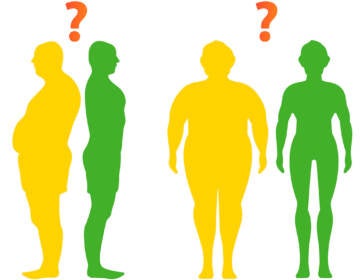Precision nutrition examines link between diet and inflammation
Diets have long been about calories, or an emphasis on different nutrients — but with precision nutrition, the approach is personalized.
Listen 9:00
Research centers are investigating the promise of precision nutrition and a national study is now underway.(Bigstock/marilyna)
This story is from The Pulse, a weekly health and science podcast.
Find it on Apple Podcasts, Spotify, or wherever you get your podcasts.
Reyna Gobel had a serious health scare in 2010. She had a terrible stomachache that wouldn’t go away. Her doctor suspected she might have cancer and sent her off to get more tests. “I was crying in my car, and after I got over that moment, I decided to get a second opinion,” said Gobel.
And she was glad that she did. Her problem turned out to be H Pylori, a bacterial infection that can be treated with antibiotics. That was a huge relief, but still, Gobel just wasn’t feeling better overall.
Severe allergies had her bed bound for about a month out of the year. She was allergic to cedar, dust, and other pollen, and her symptoms were strong. Pounding sinus pain and dizziness would keep her in bed for days at a time.
Gobel also had to take antibiotics frequently to deal with sinus infections. Another doctor told her to give up milk because dairy products can increase mucus and to use soy instead.
Nothing changed, so she looked for options outside of mainstream medicine.
Finding the culprit
She was wondering if something in her diet was contributing to her symptoms – and started working with a nutritionist. She had a blood test that looks for hypersensitivities to a lot of different foods. It’s called Mediator Release Test or MRT. This is not a test that most insurance companies will cover, or most doctors would recommend because it’s not been studied enough, and because many researchers argue that these tests are not accurate in showing food sensitivities.
The thinking is that even if you don’t have a full-blown allergic reaction to a food — smaller responses could add up and drive-up inflammation — which then causes other health issues.
Gobel got her test results back, and it turned out that soy was one of her problem foods. She eliminated soy from her diet, along with another few problematic foods, and since then, her allergy symptoms have gotten a lot better.
Different ways to target problem foods
This approach is called precision nutrition — and Gobel was hooked. She went back to school to get a master’s in public health and public health nutrition and co-created a course called Best nutrition class ever. The blood test Gobel had taken can cost about $500, so she teaches people to get a better sense of their own bodies by just eliminating different foods at a time.
“The common allergens are wheat, dairy, eggs, soy, peanuts, tree nuts, sesame, fish, and shellfish,” she explained.
People rotate foods out of their diets for several days or a week at a time — and pay close attention to how they feel, and their other health issues. They replace these foods with other healthy and fresh options. “I don’t want people to just come out of this saying, ‘you know what, wheat or dairy was a problem for me.’ I want them to come out of this and say, ‘I’m eating an overall healthier diet and giving up processed foods.’”
Subscribe to The Pulse
Diets go from broad to personal
Diets have long been about calories, or an emphasis on different nutrients like keto or Mediterranean or gluten free — but with precision nutrition, the approach is personalized.
Susan Linke is registered dietician at a private practice in the Dallas area. She also does work for Oxford Biomedical, the company that developed the blood test for food sensitivities. She says the big picture thinking here is that food and nutrition is very connected to our immune response.
“We know that 70% or so of the immune system is in the gut,” Linke said. “So, using food to reduce the inflammation is really the most benign, less invasive way to do it, but it is very impactful and very powerful.”
She says since so many big health issues are connected to inflammation — like auto-immune diseases or heart disease — it makes sense to see if there are foods that somebody has a reaction to. “The reality is you can almost react to anything, and we have people react to turmeric or ginger or salmon. So, tailoring it to the individual is way more powerful.”
Based on people’s test results, Linke creates a tailored diet plan for them.
“We really focus on what foods came back non-reactive for you,” she said. “And then the patient eats only their non-reactive foods. There’s usually a large amount of non-reactive foods that we can choose from, so that’s another benefit. They’re not on a restricted diet. It’s a pretty ample diet. They have plenty of fruits, vegetables, beans, nuts, legumes, meats, fish, spices. It’s pretty close to a diet that is 100% anti-inflammatory for that patient.”
She says people often have big reductions in their overall symptoms as a result. She hopes this approach will become more mainstream.
Precision nutrition goes big
Now, big research centers are investigating the promise of precision nutrition and a national study is underway. It’s called Nutrition for Precision Health.
Sai Krupa Das, a professor of nutrition and senior scientist at the human nutrition research center on aging at Tufts University, is one of the investigators for the study.
It takes a comprehensive look at the social environments, diets, and genetics of about 10,000 people, and it closely monitors their responses to different diets.
“We will be looking at glucose. Continuous glucose monitors are being attached to individuals and they will be looking at how the glucose varies with sleep and other variables that could change human health,” said Das. “We will be looking at activity. We’ll be looking at stool samples. The stool sample is basically where the gut microbiome lives and that’s going to be measured. We’re going to be collecting detailed information on health status, diseases, medication use.”
The hope is that this will lead to more individually-tailored diet recommendations that go far beyond the familiar “eat the rainbow, or “eat a mix of fresh foods” type of advice.
“We’re collecting all of this data because at the end we’re going to be able to say, ‘okay, if an individual is a female over the age of 45 and has a condition that is more likely to have them be at a risk for diabetes, then this is what their response is going to be and this is how we may be able to help them,’” Das said. “We will be able to get at smaller groups of individuals for whom the recommendations are going to be more precise and are going to be able to help inform them at the individual level.”
The Nutrition for Precision Health study is still enrolling participants.
WHYY is your source for fact-based, in-depth journalism and information. As a nonprofit organization, we rely on financial support from readers like you. Please give today.







